My father loves to garden and my mother loves to cook. I enjoy both as they pretty much go hand in hand. However, I have to admit that I pretty much neglected my garden for most of last year. We hired a nice man named Ricardo to help us keep things tidy but his construction skills were
underutilized by the simple tasks that we asked of him: weeding, trimming, and spreading mulch. He went on vacation, promising to check in with us when he returned. Alas, he never called. We got the message. Ricardo let us go as clients.
That said, my husband and I realized that we needed to reclaim our yard ourselves, like we used to back in ... 2011! We spent a couple of weekends filling our greencycle bin and then I attacked my little vegetable garden. It’s nothing fancy, just about 4 feet by 8 feet wide and constructed as a raised bed when we redid our backyard. Every year I plant Asian herbs and a
few summer vegetables. After preparing the bed, I went shopping for plants. Isn’t shopping the reward for lots of hard work?
Finding starters for Vietnamese herbs and other Asian aromatics is not as difficult as it used to be. Over the years, I developed a list of places that I hit to source plants. This time of year, you never know what you’ll find at:
Local nurseries and home improvement centers – I’ve found the darnest plants at our independent, local nurseries as well as places like Home Depot and Lowes. With the large big box stores, it helps to shop at one located in an area with a sizeable Asian community. I bought a Thai Kaffir (Makrut) lime tree at Home Depot twelve years ago. The Chinese garlic chives purchased 8 years before continues to be a stalwart, volunteering in various places.
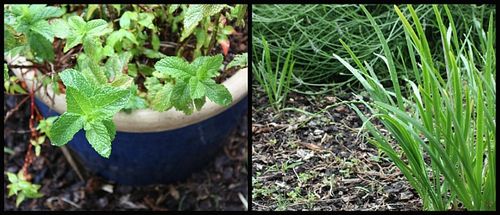
People who garden love to tinker and try new plants and this year, I was rewarded by lots of chile plants. They seem to be hot these days. (Ha.)
I basically shop by name – like Thai Dragon and Super Chile, then I read the fine print to see whether or not they’re actually hot. Some, despite their Asian provenance, lack spicy heat. This year, I planted 5 kinds of chiles
to see what would happen. We lack consistent hot temps in coastal Northern California so my back up is buying chiles from the Hmong farmers and freezing them for the long haul.
Note that common herbs such as mint and even sorrel are employed
in Asian cooking. Those seedlings may be available at mainstream nurseries and garden supply shops.
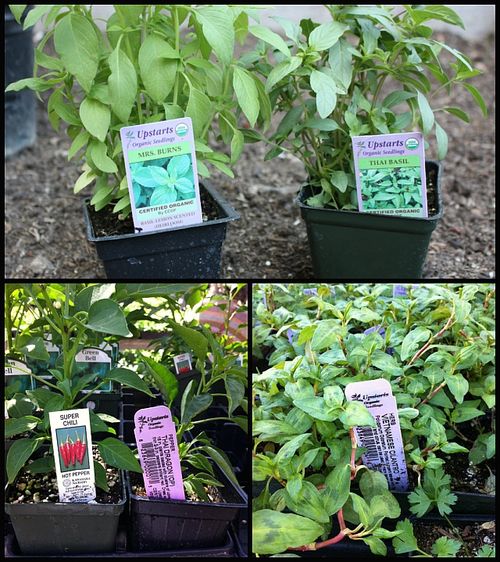
Farmers’ markets – Small nurseries sell starter plants at our farmers’ markets, and I mine their stalls for interesting plants. In Santa Cruz, for example, Upstarts Organic Seedlings always has new varieties to explore.
Last weekend, I chat with Sarah, the owner, about growing Southeast Asian long chiles and she suggested trying Joe’s Long Cayenne. She also had starters for rau ram (Vietnamese coriander), Thai purple basil (rau hung que) and Mrs. Burns basil, which she said seems to be easier to grow in our climate than Thai lime basil. I’ve had problems with Thai lime basil so I’m switching to Mrs. Burns. I’ll keep checking back with Sarah because later on this season, she’ll have Thai holy basil.
Asian Markets – One of my favorite places to source Vietnamese herbs is a tiny market in San Jose called Thien Thanh. The man who tends to the makeshift nursery speaks little but his plants are always healthy.
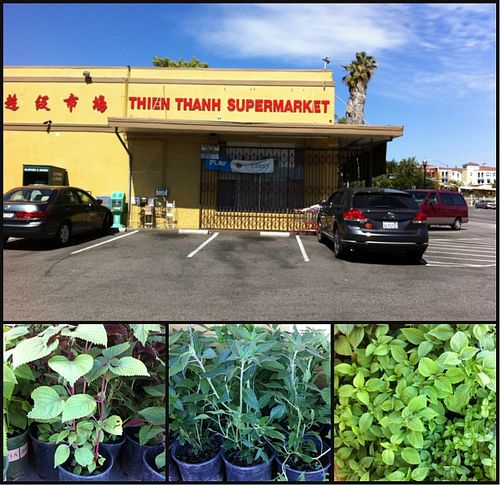
My Vietnamese balm (rau kinh gioi) didn’t reseed this year so I started with a new plant. I always need a new purple perilla (rau tia to, an earthier kin of Japanese shiso). He promised me that the black chile plant was spicy hot so I bought one. The fourth plant I purchased from him was a rice paddy herb (rau om), that I have to keep in a plastic bag where things will sweat to mimic super humid growing conditions. Prices are not marked but I was charged about $4 or $5 for each. What a deal. What a steal!
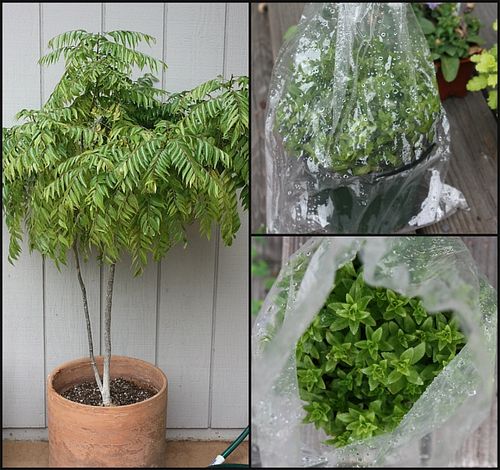
Indian grocery stores are also a great source of plants. Five years ago, I bought a curry leaf plant for [gulp] $35 from Bharat Bazaar, a somewhat sad Indian market in Santa Clara that happened to sell the plant. The Indian customers asked me why I was buying it because the market sold the leaves by the bags for about $2. I was curious, I said, and want a super fresh supply at my home. The $35 investment was a baby, no taller than 12 inches, but look at it now – a bona fide little tree on my patio.
Berkeley’s Tokyo Fish Market is an excellent source for Japanese seedlings, as well as seafood and groceries. The market displays the plants right outside the doorway. Eggplant, shishito peppers, various kinds of shiso, are among the seedlings I’ve seen there. They often sell Asian seed packets too.
You don’t need much space to cultivate a few herbs to enhance your cooking. Yes, you can buy the stuff but growing even a tiny bit of your own food is immensely rewarding and tasty to boot.
Related information:
- If you can’t source Asian herbs and seedlings in person, try one of these online seed sources.













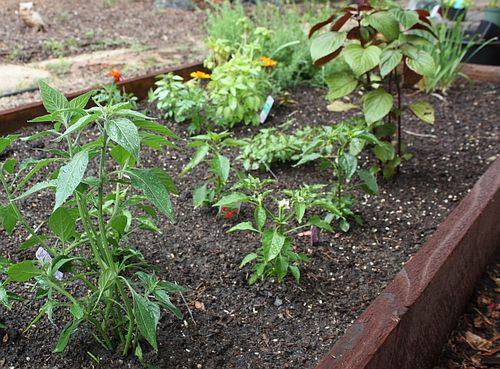


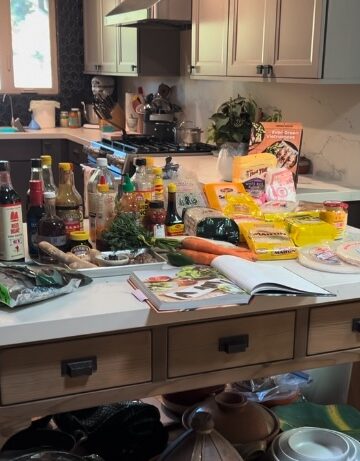
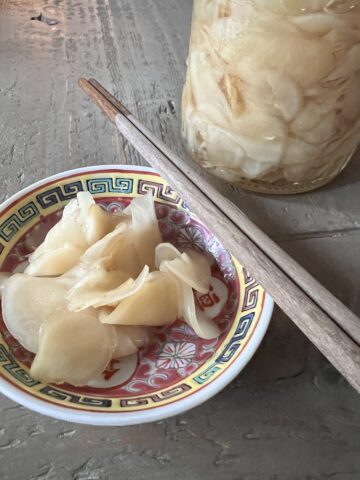
Suzette says
People laugh when I say that I don't believe in planting anything I can't eat (basically, no flowers!). For things like Thai basil and mint, I buy a baggie from Chinatown, use the leaves, and put the stumps in a glass of water until they grow roots before sticking them in the dirt. As hard as I try to keep things alive over the winter, it never seems to work, so I end up buying new plants from Chinatown every spring. I bought a Kaffir lime leaf young'un one spring for a whoppin' $10 - it was great until I had to bring it indoors for winter and then died. 🙁 Canadian winters aren't good to tropical plants.
Julie says
This is a neat list of resources. I've also noticed that very fresh basil will root in water.
Caroline says
I am totally like you..if it can't be eaten, I don't grow it 🙂
I don't have much space so I don't want to waste it with flowers.
Same thing happened to my kaffir lime tree, it died in the winter. So sad because it was delicious and it had cost me a fortune (like $60!). Luckily I still have many of its leaves in the freezer.
What a great idea about the Thai basil and mint! I will try that too.
doledrumdiva says
I am so jealous of your produce stores! Having said that, I can find most asian/vietnamese herbs to grow from seeds or cuttings here in London UK (would kill for a pandan plant, but apart from that...)
I really love rice paddy herb - and having tried to grow it from cuttings off fresh bunches with no success - I think the chilling it gets in airfreight is the killer - I discovered it in my local tropicalfish aquarium/pet shop - it is labelled by its botanical name Limnophilia aromatica - apparently there's a kind that grows underwater and the kind that survives in humid conditions as in your picture - they both taste the same... am thinking of getting a mini aquarium for the winter. Here in London, everything but mint has to come indoors during the winter - I also 'foster' my Bengali neighbour's chilli plants - I use a grow light, minimal watering (verging on neglect), and just the general level of heat from the central heating - in a British winter, coming home to a mini jungle is a thing of joy!
Maggie says
I would love to do this as fresh herbs make such a difference to a dish, and are even lovely to nibble with bread and cheese, but are something of a luxury to purchase regularly. The trouble is, I'm not at all green fingered, and we have male cats that spray, so beds in the garden would be out of the question. Perhaps a greenhouse? Thanks for the inspiration!
Andrea Nguyen says
Oh no about your Kaffir lime dying! As much as the breeders have tried, it's a tree that needs some warmth. If it's any consolation, my Kaffir lime gets black mold and scales every year. I couldn't get rid of it so I just wait till the weather warms up and trim. The life of plants...
Andrea Nguyen says
You too on the Kaffir lime? :-/
Andrea Nguyen says
Yes, so very true. If you can get a cutting from someone's plant, root it in water!
Andrea Nguyen says
I was wondering about rice paddy grown in an aquarium! The last time I tried this bag thing with it, I ended up frying it a tad because I forgot to moisten.
Ah, to promote grow lights for edible herbs...!
Andrea Nguyen says
You can do it, Maggie! Yes, perhaps a green house. Just found this forum discussion for your consideration...
http://www.wildaboutbritain.co.uk/forums/wildlife-gardening/187-how-keep-cats-out-garden-3.html
Diane says
Nice curry leaf tree! Mine died as a small stub. It never thrived, but perhaps I should try again.
Peter says
I received a five Limnophila Aromatica cuttings in a small tented pot from a grower last month. It was my intent to grow rice paddy herb (and hac ha) for anytime canh chua. Two weeks have passed and all have died. I want to try again but not with the same supplier. Few on-line companies sell the cuttings and most are for aquarium use. The few I have had email correspondence with say it is the same plant, but none have verified if it can go from a water culture to a tented pot on my porch. Fish tank landscape is what they do.
Ms. Andrea, you ask the $64 question, does anyone cook with the aquarium harvested rice paddy herb? Also, can aquarium cuttings go from the water to a tented bag over a pot and grow like the pictures in your blog?
Great blog. Thank you all.
Does anyone know where to get bac ha bulbs?
Pamina says
Lovely! Does your curry leaf make it through our winters? I'm in Oakland and have been keeping my baby curry leaf plant in the greenhouse, but would love to be able to take it outside.
Andrea Nguyen says
Peter, here's a site for you:
http://www.floraexotica.ca/Vegie.htm
Bac Ha is known as "Elephant Ear" but I'm not sure if something like this is edible. Maybe the grower can tell you?
http://www.edenbrothers.com/store/upright-elephant-ears-bulbs.htm
Tessa says
Elephant ear is edible. We use the stalks in soup, you have to peal it.
Andrea Nguyen says
Yes it is -- Colocasia gigantea, called bac ha in southern Vietnamese, is most often eaten. Yes to the stalks for soups. The leaves are used in South Asian preparations. Are both the green and purple kind edible? I've only seen the green one eaten.
Andrea Nguyen says
Oh no, I moved mine around on the hot patio and kept feeding it.
Andrea Nguyen says
Pamina, during winter, I keep it outdoors on the patio close to the house. It sheds some leaves but revives and grows more. I've been perplexed about how to prune the thing because mine tend to grow up and not out as much. Once you clip a branch, nothing seems to grow back. It's strange but I just keep nurturing the plant.
Hung Tran says
I am surprise that with your lectures and speech to large audience but you did not obtain seed from several
seed companies. The company Kitazawa Seed Co is near to you at OAKLAND..
Andrea Nguyen says
Kitazawa is easier with online orders for folks. It's sold locally in the Bay Area at certain shops. Even so, the entire catalog is not represented at retailers. The catalog is great to browse!
Brian says
I'm seeing a lot of Rau Ram at nurseries in Orange County lately (Armstrong and Roger's Gardens). Bought a couple to try out. The label says to give them full sun and a lot of water. Excited!